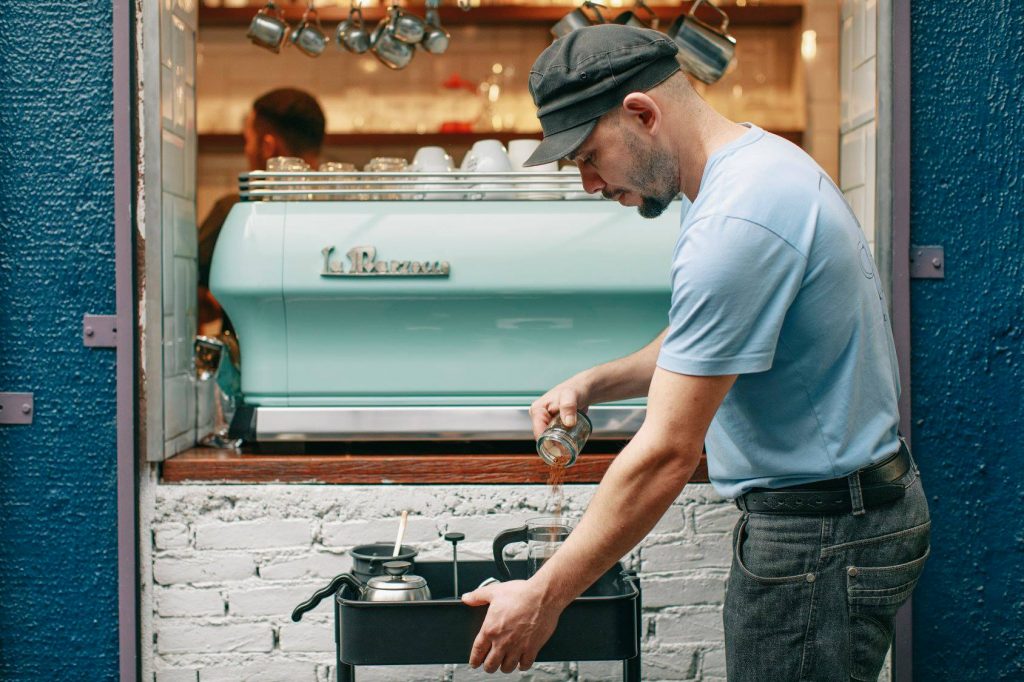São Paulo – Aiming to offer free training and give opportunities to young people in social risk, the project Fazedores de Café exists since 2014. Last year, for the first time ever, its creators decided to accept refugee students. “It is very important social problem that we saw in Brazil. Directing these people coming from abroad and looking for a job. We can welcome them and positively influence their lives. The course is very helpful boosting their self-esteem. That happened with me. The idea is always helping someone in social risk. Other classes were composed by students from poor neighborhoods or on community service,” the project coordinator Paulo Gabriel Maciel da Silva told in interview to ANBA.
Now coordinating the project, he was a student of the first class trained by Fazedores de Café. The project is conceived and developed by Sofá Café – chain of coffeehouses from São Paulo. The classes for refugees started in October 2018 and will continue until April this year. The project rate of employment is 90%. To enter the course, students go through a pre-selection in partner NGOs. The students in the current class include one from Syria, one from Mali and one from Congo, in addition to two Brazilians. This diverse class learns about the coffee world inside the Sofá Café facility in Pinheiros, São Paulo.
Knowledge
The course curriculum comprises different subjects. “I’m not just talking about the making, but also about cultivation and production. We’ll usually go out to the farm and take lessons with coffee growers. And from the ‘farm gate on out’ we’ll talk about roasting, tasting and preparing the drink. We’ll also discuss customer service, particular things that Fazedores can offer in Brazil: the cafeteria business, service, ethics, body expression are classes we do with people who are specialists,” the coordinator revealed.
In order to welcome refugees, Fazedores also included a lesson on communication. “In Fazedores de Café, I see the drink and its complexity as an excuse for helping out. More than about overseeing classes on coffee, it’s about a loving relationship, about paying attention and making oneself present. And about trying to steer them with focus, attention and commitment to the classes,” said Silva.
“This new class is very different from the ones I’ve coordinated in the past. They come from a different background. These young people have gone through situations I already been through, so I had a clearer understanding of their needs than with the previous class. For this class, I guess the methods are very different. It’s much more about a relationship of understanding,” pondered Silva.
The musician
Rajana Oulby of Syria (pictured) is a musician. Living in Brazil for three and a half years now, he worked at a farm and as an electrician. The almost 20 months he spent in the farm helped Rajana bring his family to Brazil. “When I arrived I didn’t know anyone, I didn’t speak Portuguese. And I made it, I learned by speaking with Brazilians. Things are easier now. The Brazilians helped me bring my family. And I had to bring them by any means,” he recalled.
Rajana is now back to living in São Paulo to pursue his dream. “When things cooled off, I decided to go back to working with what I love to do: music,” says he, who started the band Brisa do Oriente, which plays Arab music.
As he writes songs and works to promote his band, Rajana found out about Fazedores. “A friend called me and said there was this course I could take. I really like coffee, I drink some good ones around here! And I wanted to learn more about the drink. The experience is turning out to be great! I’ve learned a lot. I never knew there was so much to learn about coffee. Now I know this is a big world,” he said.
And apart from coffee? “By working here [in the Fazedores project] I’ll learn new words and make new friends. Each job has something new, and I’m learning a lot,” the Syrian said. Upon completing the course, Rajana intends to keep making music and finding work with his newly acquired knowledge about coffee.
Translated by Guilherme Miranda & Gabriel Pomerancblum




